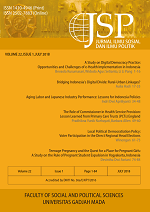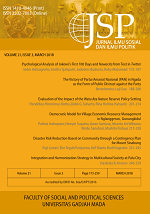Examining a Tuanku's Political Power in West Sumatra
Welhendri Azwar(1*), Yuli Permatasari(2), Mufti Ulil Amri(3)
(1) State Islamic University of Imam Bonjol Padang, Indonesia
(2) Palanta Riset dan Ilmu Sosial, Indonesia
(3) State Islamic University of Imam Bonjol Padang, Indonesia
(*) Corresponding Author
Abstract
This study examines the authority of a tuanku, a leader of the tarekat (mystical teaching) community in West Sumatra, Indonesia—a charismatic figure with a significant role in the region's socio‐ political landscape. He issues political statements or ‘political fatwa’ regarding a certain issue to help determine choices. As such, political leaders seek to win his favor for an advantage in political contests. Data were collected from in-depth interviews with teachers and congregational members of the tarekat community to examine a tuanku's charismatic authority in the socio-political dynamics. The study reveals that a tuanku’s influence is strong, his understanding of politics is closely related to the religious understanding of the tarekat school, and his charisma impacts the political choices of the tarekat community. This study contributes to the literature by providing evidence of a religious figure's charismatic authority in West Sumatra's socio‐political dynamics.
Keywords
Full Text:
PDFReferences
Abdullah, S. (1997). Agama dan Masyarakat: Pendekatan Sosiologi Agama. Jakarta: Logos Wacana Ilmu.
Allport, G. W., & Ross, J. M. (1967). Personal Religious Orientation and Prejudice. Journal of Personality and Social Psychology, 5(4), 432–443. https://doi.org/https://doi.org/10.1037/h0021212
Amir, Z. A. (2003). Peta Islam Politik Pasca Soeharto. Jakarta: Pustaka LP3ES.
Arkoun, M. (1994). Nalar Islam dan Nalar Modern: Berbagai Tantangan dan Jalan Baru. In J. H. Meuleman (Ed.). Jakarta: INIS.
Asfar, M. (2006). Pemilu dan Perilaku Memilih 1955-2004. Surabaya: Pustaka Eureka.
Azra, A. (1992). Jaringan Ulama Timur Tengah dan Kepulauan Nusantara Abad XVII dan XVIII: Melacak Akar-akar Pembaruan Islam Indonesia. Bandung: Mizan.
Azra, A. (1994). Pergolakan Politik Islam, dari Fundamentalisme, Modernisme dan Post Modernisme. Jakarta: Paramadina.
Azwar, W. (2015). Gerakan Sosial Kaum Tarekat. Padang: Imam Bonjol Press.
Azwar, W. (2018). The Resistance of Local Wisdom Towards Radicalism: The Study of Tarekat Community in West Sumatra, Indonesia. Journal of Social Sciences and Humanities, 2(1), 75–102. Retrieved from http://www.pertanika.upm.edu.my/Pertanika PAPERS/JSSH Vol. 26 (1) Mar.2018/05 JSSH‐1622‐2016‐3rdProof.pdf
Azwar, W ., Hasanuddin, H., Muliono, M., Permatasari, Y., Amri, M. U., & Yurisman, Y. (2020). The Models of Nagari Indigenous Governments in West Sumatra. Jurnal Bina Praja, 12(1), 33–42. https://doi.org/10.21787/jbp.12.2020.33‐42
Azwar, W., Yunus, Y., Muliono, M., & Permatasari, Y. (2018). Nagari Minangkabau: The Study of Indigenous Institutions in West Sumatra, Indonesia. Jurnal Bina Praja, 10(2), 231–239. https://doi.org/10.21787/jbp.10.2018.231‐239
Brug, W. van der, & Mughan, A. (2007). Charisma, Leader Effects and Support for Right‐Wing Populist Parties. Party Politics, 13(1), 29–51. https://doi.org/10.1177/1354068806071260
Budiarjo, M. (2008). Dasar-dasar Ilmu Politik. Jakarta: PT. Gramedia Pusaka Utama.
Burke, B. L., Kosloff, S., & Landau, M. J. (2013). Death Goes to The Polls: A Meta-Analysis of Mortality Salience Effects on Political Attitudes. Political Psychology, 34(2), 183–200. Retrieved from http://faculty.fortlewis.edu/burke_b/Teaching Portfolio/Burke, Landau, & Kosloff 2013.pdf
Conger, J. A., & Kanungo, R. N. (1987). Toward a Behavioral Theory of Charismatic Leadership in Organizational Settings. Academy of Management Review, 12(4),637–647. https://doi.org/10.5465/amr.1987.4306715
Crappas, R. W. (1993). An Introduction to Psychology of Religion. A. M. Hardjana (Trans.). Yogyakarta: Kanisius.
Efriza. (2012). Political Explore. Bandung: Alfabeta.
Eisenstadt, S. (Ed.). (1968). Max Weber on Charisma and Institution Building. Chicago: University of Chicago Press.
Faridl, M. (2007). Peran Sosial Politik Kyai di Indonesia. Jurnal Sosioteknologi, 11(6), 238–243.
Geertz, C. (1983). Abangan, Santri, Priyayi dalam Masyarakat Jawa. A. Mahasin (Trans.). Jakarta: PT. Pustaka Jaya.
Gerber, A. S., Huber, G. A., Doherty, D., Dowling, C. M., & H A, S. E. (2010). Personality and Political Attitudes: Relationships across Issue Domains and Political Contexts. American Political Science Review, 104(1), 111–133. https://doi. org/10.1017/S0003055410000031
Gurov, B., & Zankina, E. (2013). Populism and the Construction of Political Charisma. Problems of Post-Communism, 60(1), 3–17. https://doi.org/10.2753/PPC1075‐8216600101
Hale, H. E. (2005). Regime Cycles: Democracy, Autocracy, and Revolution in Post-Soviet Eurasia. World Politics, 58(1), 133–165. https://doi.org/10.1353/wp.2006.0019
Hariantati, R. (2003). Etika Politik dalam Negara Demokrasi. Jurnal Demokrasi, 2(1), 57–68. Retrieved from http://ejournal.unp. ac.id/index.php/jd/article/view/2544/2150
Herek, G. M. (1987). Religious Orientation and Prejudice: A Comparison of Racial and Sexual Attitudes. Personality and Social Psychology Bulletin.
Horikoshi, H. (1987). Kyai dan Perubahan Sosial. Jakarta: LP3ES.
Irtanto. (2014). Role of Mass Media to Political Participation on The Mayoral Election of Kediri East Java, Indonesia. Academic Research International, 5(5), 211–225. Retrieved from http://www.savap.org.pk/ journals/ARInt./Vol.5(6)/2014(5.6‐21).pdf
Isaacs, R. (2015). Charismatic Routinization and Problems of Post-Charisma Succession in Kazakhstan, Turkmenistan and Uzbekistan. Studies of Transition States and Societies, 7(1), 60–61. Retrieved from http://publications.tlu.ee/index.php/stss/article/view/259/180
Ivancevich, J. M., Konopaske, R., & Matteson, M. T. (2007). Perilaku dan Manajemen Organisasi. Jakarta: Erlangga.
Jarbawi, A., & Pearlman, W. (2007). Struggle in a Post-Charisma Transition: Rethinking Palestinian Politics after Arafat. Journal of Palestine Studies, 36(4), 6–21. https://doi. org/10.1525/jps.2007.36.4.6
Kung, H. (2002). Etika Global. Yogyakarta: Qalam.
Lindahl, R. (2008). Shared Leadership: Can It Work in Schools? The Educational Forum, 72(4), 298–307.
Madjid, N. (1995). Islam Agama Kemanusiaan, Membangun Tradisi dan Visi Baru Islam Indonesia. Jakarta: Paramadina.
Mukhlis. (2015). Perilaku Politik Elit Keagamaan dalam Politik Lokal. Jurnal Salam, 18(1), 21–39.
Noer, D. (1982). Pemikiran Politik di Negeri Barat. Jakarta: PT. Rajawali.
Paloutzian, R. F. (1996). Invitation to Psychology of Religion. Boston: Allyn & Bacon.
Rai, P. (2019). ‘Wave Elections’, Charisma and Transformational Governance in India. South Asia Research, 39(3), 253–269. https:// doi.org/10.1177/0262728019861763
Ritzer, G. (1996). Modern Sociological Theory. New York: The Mc Graw-Hill Companies.
Samad, D. (2003). Syekh Burhanuddin dan Islamisasi Minangkabau: Syarak Mandaki Adat Manurun. Jakarta: The Minangkabau Foundation.
Sang,J.A.,&Rowatt,W.C.(2007).TheRelationship Between Religious Orientation, Right Wing Authoritharianism and Implicit Sexual Prejudice. International Journal for The Psychology of Religion, 17(2), 99–120. Retrieved from http://www.baylorisr.org/ wp‐content/uploads/tsang_relationship. pdf
Scharf, B. R. (1995). Kajian Sosiologi Agama. M. Husein (trans.). Yogyakarta: Tiara Wacana.
Setiadi, E. M., & Kolip, U. (2015). Pengantar Sosiologi Politik. Jakarta: Kencana.
Sholichin, M. M. (2009). Perilaku Politik Kyai di Pamekasan. Jurnal Karsa, 15(1), 35–43. Retrieved from http://ejournal. iainmadura.ac.id/index.php/karsa/article/ view/112/104
Smith, D. N. (1998). Faith, Reason, and Charisma: Rudolf Sohm, Max Weber, and the Theology of Grace. Sociological Inquiry, 68(1), 32–60. https://doi.org/10.1111/j.1475‐682X.1998.tb00453.x
Spilka, B. at. al. (2003). The Psychology of Religion: An Empirical Approach. New York, London: The Guilford Press.
Suhelmi, A. (2004). Pemikiran Politik Barat: Kajian Sejarah Perkembangan Pemikiran Negara, Masyarakat dan Kekuasaan. Jakarta: PT. Gramedia Pustaka.
Suryana, A. (2011). Perilaku Politik di Indonesia. Aspirasi, 1(2), 1–13.
Taylor, J. S.. (2012). Max Weber Revisited: Charisma and Institution at The Origins of Christianity. Australian EJournal of Theology, 19(3), 195–208.
Thohir, A. (2002). Gerakan Politik Kaum Tarekat: Telaah Historis Gerakan Politik Anti Kolonialisme Tarekat Qadiriyyah-Naqsyabandiyyah di Pulau Jawa. Bandung: Pustaka Hidayah.
Tohari, M. H., & Jacky, M. (2015). Perilaku Politik Santri pada Pemilu Legislatif 2014. Jurnal Paradigma, 3(1), 1–9. Retrieved from https://jurnalmahasiswa.unesa.ac.id/index.php/paradigma/article/view/10421/10159
Truskie, S. D. (2002). Leadership in High Performance Organizational Cultures. London: Quorum Books.
Turner, B. S. (1974). Sosiologi Islam: Suatu Telaah Analistis Atas Tesa Sosiologi Weber. (G. A. Ticoalu, Ed.). Jakarta: CV. Rajawali.
Turner, B. S. (2012). Relasi Agama dan Teori Sosial Kontemporer. I. R. Muzir (trans.). Yogyakarta: IRCiSoD.
Van-Bruinessen, M. (1992). Tarekat Naqsyabandiyah di Indonesia. Bandung: Mizan.
Veeger, K. J. (1990). Realitas Sosial: Refleksi Filsafat Sosial atas Hubungan Individu-Masyarakat dalam Cakrawala Sejarah Sosiologi. Jakarta: PT. Gramedia Pusaka Utama.
Weber, M. (1978). Economy and Society: An Outline of Interpretive Sociology. (G. Roth & C. Wittich, Eds.). Berkeley: University of California Press.
Williams, E. A., Pillai, R., Lowe, K. B., Jung, D., & Herst, D. (2009). Crisis, Charisma, Values, and Voting Behavior in the 2004 Presidential Election. The Leadership Quarterly, 20 (2), 70–86. https://doi.org/10.1016/j.leaqua.2009.01.002
Wrong, D. (Ed.). (2003). Max Weber Sebuah Khazanah. A. Asnawi (Trans.). Yogyakarta: Ikon Teralitera.
Yukl, G. (2005). Leadership in Organizations. Jakarta: Index.
Article Metrics
Refbacks
- There are currently no refbacks.
Copyright (c) 2023 Jurnal Ilmu Sosial dan Ilmu Politik

This work is licensed under a Creative Commons Attribution-ShareAlike 4.0 International License.






















